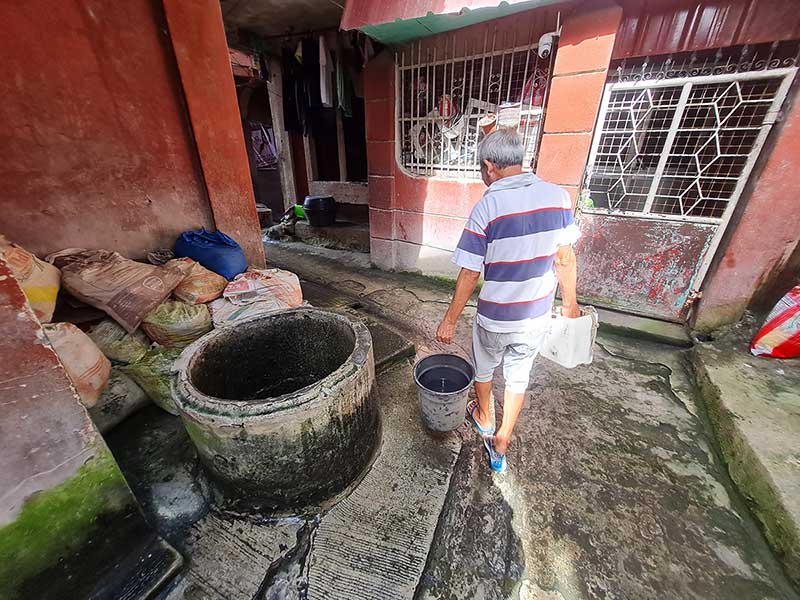
By John Noel E. Herrera
The Iloilo City Health Office (ICHO) will conduct water inspections in different schools in the metro amid the acute gastroenteritis (AGE) and cholera outbreak caused by contaminated food or water.
ICHO also said that they are already coordinating with the Department of Education (DepEd)-Iloilo City to make sure that all the students in schools are safe as the city is under a state of calamity status due to the continuous increase in cases of food and water-borne diseases.
According to Iloilo City Epidemiology and Surveillance Unit (ICESU) head Dr. Marigold Calsas it is important to check all the water sources in schools to avoid further contamination as not all students who are attending face-to-face classes bring their own drinking water.
Calsas reiterated that all academic institutions should undergo water quality testing to check if the water they are drinking is potable.
Calsas also said that they will be conducting lectures in schools to educate both the students and the teachers about the two food and water-borne diseases, and how to avoid them.
Data from ICHO as of Sept 3, 2022, indicated eight cholera cases (seven recovered and one active) and 342 AGE cases (191 recovered, 85 admitted, 58 under treatment at home and eight fatalities) in Iloilo City.
Based on age, children aged 1 to 10 years old accounted for the most AGE infections (156 cases), followed by 11 to 20 years old (46), less than 1 year old (30), 21 to 30 years old (28), 31 to 40 years old (22), 41 to 50 years old (17), 51 to 60 years old (9), and 61 to 70 years old and 71 to 80 years old (8 each).
“On Monday, masugod na kami lecture sa schools regarding how to prevent the acute gastroenteritis (AGE) sa mga eskwelahan kag ang mga first aid remedies nga ara sa school,” Calsas said
(On Monday, we will start lecturing in schools regarding how to prevent acute gastroenteritis in schools, and the first aid remedies that we have as well in schools.)
Two canteens coming from a university in City Proper were also positive for coliform bacteria during the initial water sample analyses and bacterial tests conducted by the ICHO.
Mayor Jerry P. Treñas also issued Executive Order No. 054, directing all water refilling stations in Iloilo City to undergo mandatory water potability testing after some refilling stations and deep and tube wells in the city were positive for coliform and E. coli bacteria during the initial water quality analyses and bacteria tests conducted by ICHO.
Iloilo City Councilor Dr. Urmanico Baronda, committee on health chair, also cautioned everyone, especially the students against buying street food as the food and drinks might be contaminated.
Meanwhile, the CHO detected more water refilling stations and deep wells that were contaminated with bacteria amid the AGE outbreak.
As of Sept. 1, the CHO tested 44 water refilling stations in the metro for water potability testing.
Out of the 44 water refilling stations, five tested positive for both e-coli and coliform while 20 tested positive for coliform.
The ICHO also tested 56 deep wells and out of the said number, 39 tested positive for both e-coli and coliform while 15 tested positive for coliform.
Most of the contaminated wells and refillers were located in areas in the city where clustering of AGE and cholera cases were detected.
According to Dr. Annabelle Tang, the presence of coliform in a water supply indicates that there is possible contamination. Hence, further tests are needed.
“Actually, ang e-coli is family member man sang coliform. Both of them are bacteria halin which can be detected sa aton environment particularly sa mga groundwater contamination. Kon positive ka sa coliform, supposed to be warning na nga contaminated imo tubig, so kinahanglan itest pa gid to determine if may presence of e-coli,” she explained.
Currently, there are 252 water refilling stations in the metro while deep wells totaled more than 19,000.
Iloilo City Mayor Jerry Treñas through Executive Order No. 054 has ordered the mandatory water potability testing of all water refilling stations in Iloilo City every month.
The EO strictly mandates that only sanitation officers of the CHO will be allowed to get the water samples and the samples shall only be tested in accredited laboratories.
All personnel of the water refilling stations are also required to secure a health card issued by the CHO.
Meanwhile, Tang added that they have also condemned several deep wells in the metro prohibiting the public from sourcing water from the said wells.
AGE cases continue to surge in the metro affecting 71 barangays. CHO said that Metro Iloilo Pacific Water (MIPW) will provide free bulk water supply to the affected barangays through the static tanks.
MIPW will also be conducting disinfection measures among the affected barangays to ensure that the water quality is safe for consumption.
The CHO advised the public to be vigilant and ensure that their sources of water supply are safe.
Tang also reminded the public to thoroughly clean the water containers as they can also be contaminated due to contamination or mishandling.
“Tinluan gid dapat ang mga water containers. Maskin limpyo imo tubig kon higko ang container, it can be a cause of contamination. Amo ina mangin limpyo gid kita, tinluan ang mga water containers kag mga tangke regularly,” she said.
Iloilo City was placed under a state of calamity last Friday, Sept. 2 due to the AGE and cholera outbreak. (DG)




















